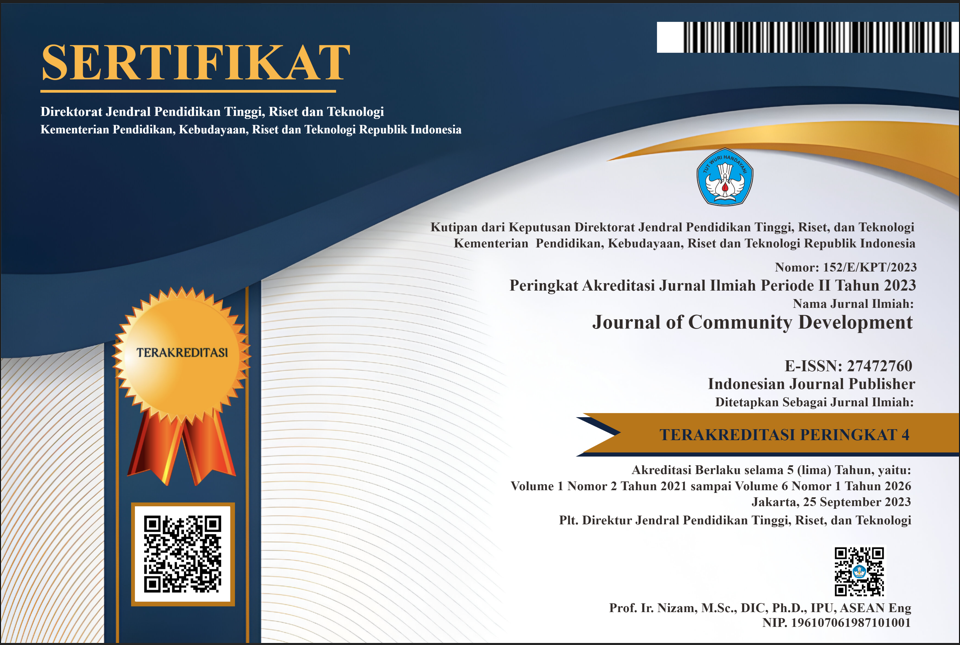Pelatihan Pembuatan Sabun Cuci Piring Berbasis Eco-Enzyme Sebagai Upaya Menumbuhkan Jiwa Wirausaha Siswa SMA Muhammadiyah 3 Jember
DOI:
https://doi.org/10.47134/comdev.v4i3.170Keywords:
eco-enzyme, dish soap, training, entrepreneurshipAbstract
One of the big problems facing Indonesia is unemployment and waste management. The Central Statistics Agency (BPS) recorded February 2023 data that there were still 7.99 million unemployed in Indonesia. In terms of education, the highest unemployment rate (TPT) is experienced by high school (SMA) and vocational high school (SMK) graduates. One of the efforts to reduce the high number of unemployed, Senior High Schools (SMA) are expected to play an active role in producing graduates who can create jobs. The waste problem in Indonesia is also a problem that has not been resolved to date. Indonesia is estimated to produce 187.2 million tons of waste every year, with 60% coming from organic waste. One solution for handling organic waste is the application of Eco-enzyme. The aim of this activity is to provide training in making Eco-Enzyme based dish washing soap as an effort to foster the entrepreneurial spirit of students at SMA Muhammadiyah 3 Jember. This activity was carried out in the form of direct outreach and training to 75 students. Based on the results of observations of these activities, SMA Muhammadiyah 3 Jember has never implemented making dishwashing soap from organic waste. This can be seen from the pre-test with the results that only 21% of students had a good level of knowledge about Eco-Enzyme. Furthermore, the post-test results after carrying out this training, those with good knowledge levels increased to 92%. The pretest and posttest results show that on average the training participants experienced an increase in knowledge and understanding about the Eco-Enzyme-based Dish Soap Making Training, so it is hoped that it can motivate students' entrepreneurial interest by thinking creatively and innovatively.
Downloads
References
Astrini, M., & Purbadharmaja, I. (2013). Pengaruh PDRB, Pendidikan dan Pengangguran Terhadap Kemiskinan di Provinsi Bali. E-Jurnal Ekonomi Pembangunan Universitas Udayana, 2(8), 384– 392.
Bernadin (2017) Pemberdayaan Masyarakat Desa Citeras Rangkasbitung Melalui Pengolahan Sampah dengan Konsep Eco-enzyme dan Produk Kreatif yang Bernilai Ekonomi. Prosiding Seminar Nasional Pengabdian Kepada Masyarakat (2).
Faustine V. (2022). Upaya Pengurangan Sampah Plastik Di Laut Indonesia Berdasarkan Konvensi Basel 1980 Dalam Rangka Pemenuhan Target Sustainable Development Goals Ke-14. Belli Ac Pacis 8 (2).
Ginting, N., Hasnudi, H., & Yunilas, Y. (2021). Eco-enzyme Disinfection in Pig Housing as an Effort to Suppress Esherechia coli Population. Jurnal Sain Peternakan Indonesia, 16(3), 283–287.
Juniartini, N. L. P. (2020). Pengelolaan Sampah Dari Lingkup Terkecil dan Pemberdayaan Masyarakat sebagai Bentuk Tindakan Peduli Lingkungan. Jurnal Bali Membangun Bali, 1(1), 27–40.
Meilani S, Ekonomi Pembangunan (2014). Analisis Penyerapan Tenaga Kerja di Kota Magelang Dengan Metode Analisis Hierarki Proses (AHP). Economics Development Analysis Journal 3(1).
Pakki, T., Adawiyah, R., Yuswana, A., Namriah, Dirgantoro, M. A., & Slamet, A. (2021). Pemanfaatan Eco-enzyme Berbahan Dasar Sisa Bahan Organik Rumah Tangga dalam Budidaya Tanaman Sayuran di Pekarangan. Prosiding PEPADU 2021 Seminar Nasional Pengabdian kepada Masyarakat Tahun 2021 (Vol. 3, pp. 126–134). Lombok: LPPM Universitas Mataram.
Retno, S., I., Annah, H., Setiana A. (2021). Pelatihan Pembuatan Sabun Cuci Tangan Anti Bakteri Berbasis Eco Enzym Dari Limbah Buah-Buahan dan Sayuran. Bantenese Jurnal Pengabdian Masyarakat, JPM Bantenese, 3(2), pp. 104-112
Saifuddin, S., Syahyadi, R., Nahar, N., & Bahri, S. (2021). Peningkatan Kualitas Utilization of Domestic Waste for Bar Soap and Enzym Cleanner (Ecoenzym) Sebagai Bahan Baku Pembuatan Sabun. Jurnal Vokasi, 5(1), 45–56.
Satria R (2022). Sentiment Analisis Antusias Masyarakat Terhadap Sampah Plastik Dengan Menggunakan Metode Support Vector Machine (SVM). JITTER- Jurnal Ilmiah Teknologi dan Komputer 3.
Survei Angkatan Kerja Nasional - Sakernas (2023). Tingkat Pengangguran Terbuka Berdasarkan Tingkat Pendidikan, 2021-2022.
Vama L, Cherekar MN. (2020). Production, Extraction and Uses of Eco-Enzyme Using Citrus Fruit Waste: Wealth From Waste. Asian Jr of Microbiol Biotech Env Sc 22(2):346–351.
Downloads
Published
How to Cite
Issue
Section
License
Copyright (c) 2024 Afan Bagus Mananda, Ara Nugrahayu Nalawati, Retno Murwanti, Danu Indra Wardhana, Andika Putra Setiawan, Alda Wata Alim, Nanda Putri Eryani

This work is licensed under a Creative Commons Attribution 4.0 International License.







